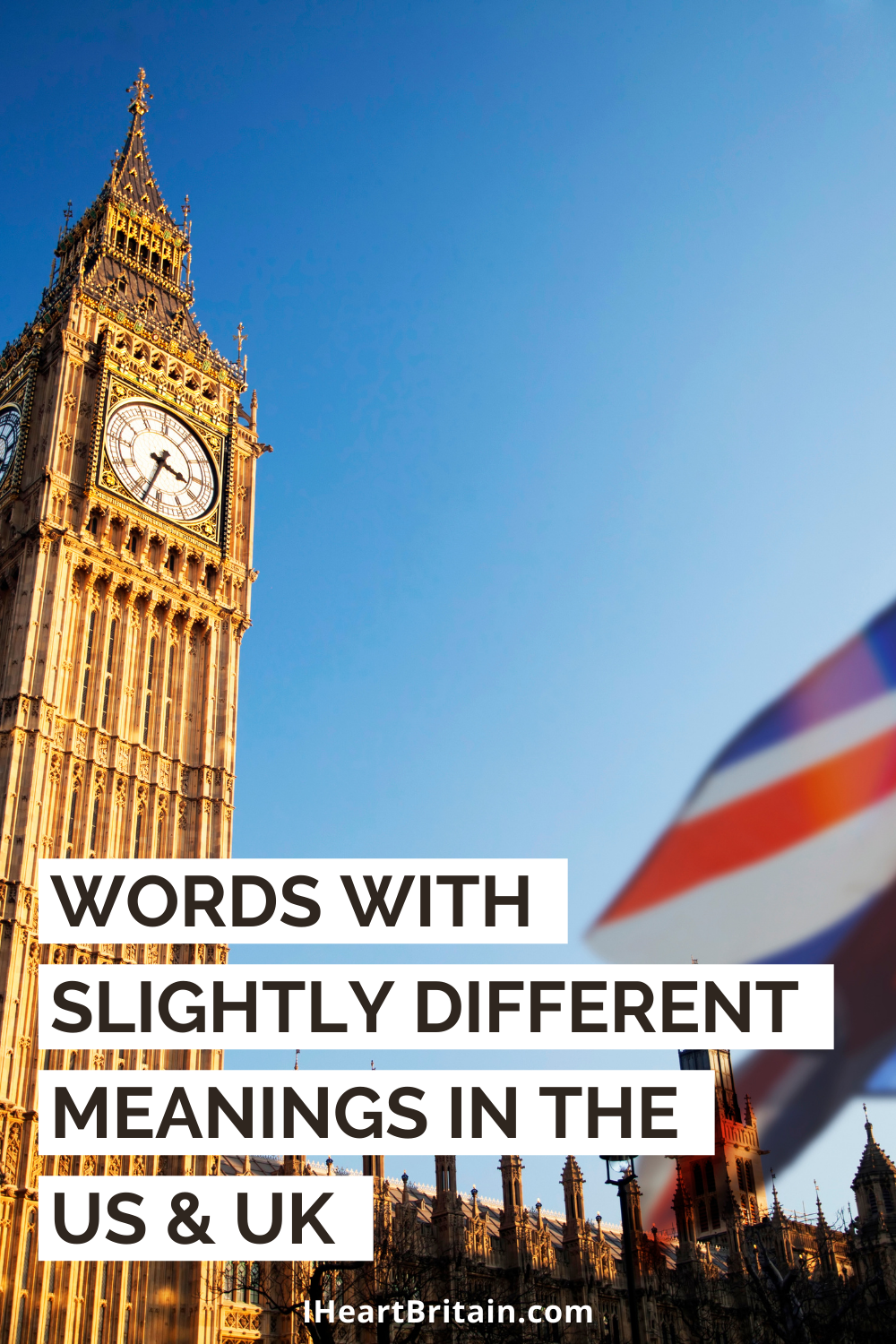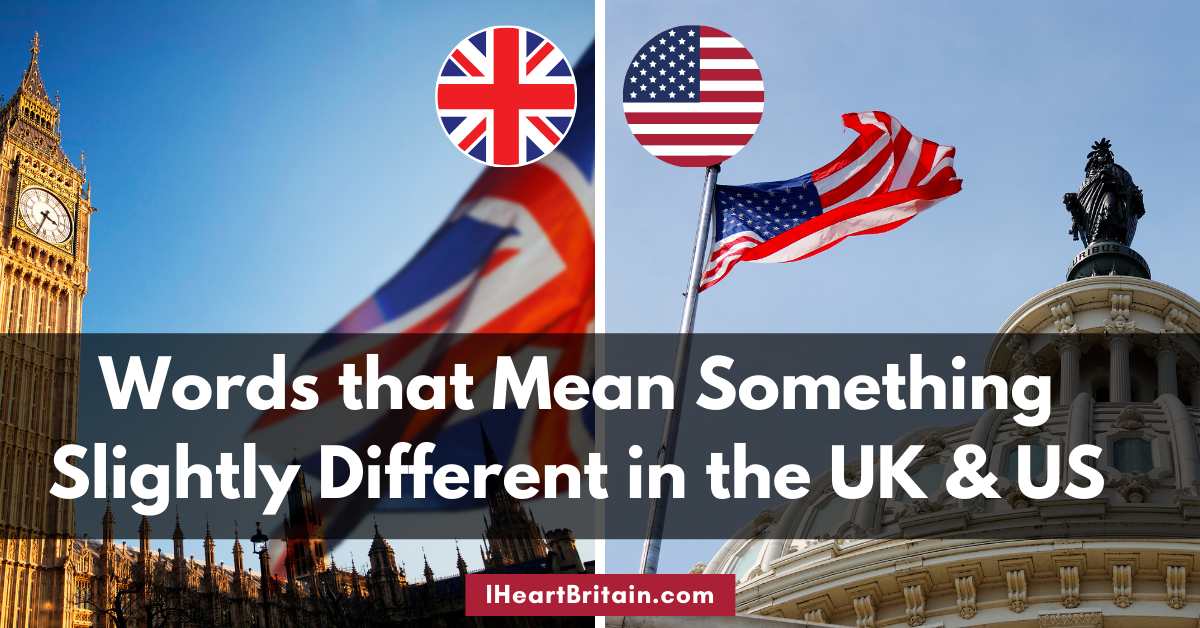
Until you take in a fair amount of both cultures, it's hard to overlook just how many language differences there are between the US and UK. Some words are different in big and obvious ways, like candyfloss and cotton candy or aubergine and eggplant.
Others are basically the same, but with slightly different spellings or pronunciations on each side of the pond. For example, garage is spelled the same, but Brits put the emphasis on the first syllable and Americans put it on the second. The word that's spelled “aluminum” in the US is “aluminium” in the UK.
Those types of words aren't what we're talking about in this post, though. In this post, we want to take a look at some of the trickier words – the ones most likely to trip up travellers and TV watchers because they seem familiar, even though there are important differences in how they're used.
It's also worth mentioning that if you're an American travelling in the UK and you use one of these words, the Brits around you are fairly likely to know what you mean. Most British people have had quite a bit of exposure to both Americans and American culture, so between the context and your accent, they're likely to get the idea.
Table of Contents
12 Words With Subtly Different Meanings in the UK and UK
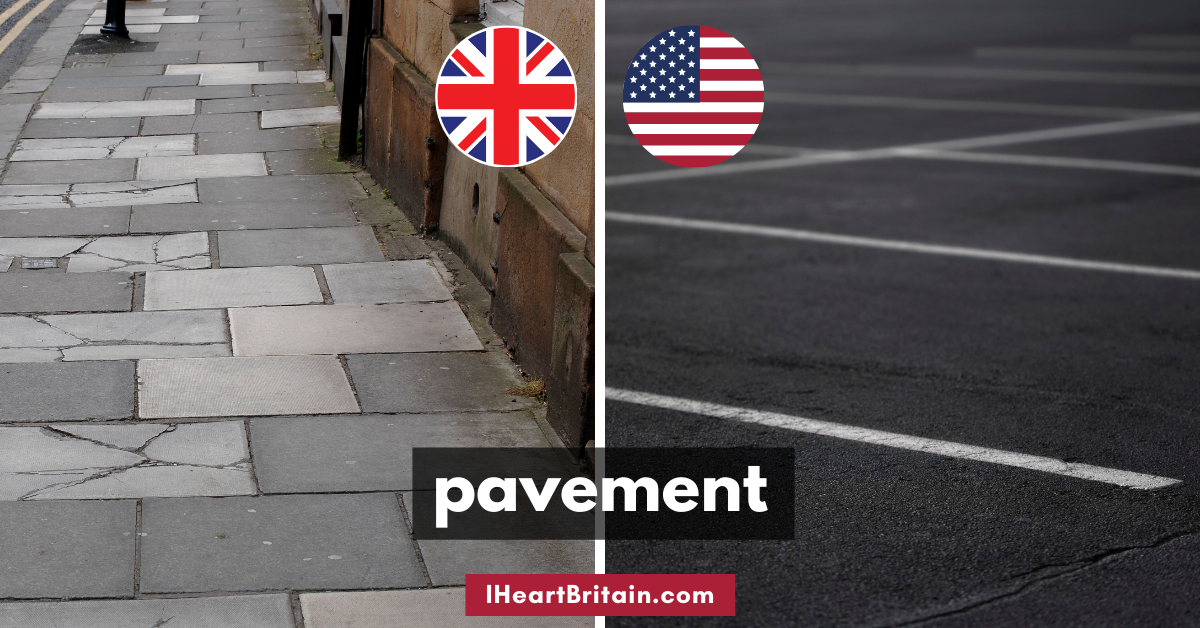
Pavement
In the UK, pavement refers to the raised walking path along streets – what Americans generally call the “sidewalk”. In the US, pavement refers to a paved surface like a road, parking lot, or school playground (there's some regional variation, of course).
Middle class
No matter where you are, “middle class” is a tough thing to define. Some use strict economic terms, chopping out the middle section of earners. Others think of a certain standard of living that gives you the basics + a few extras. One thing that's clear, though, is that when you're talking about everyday use in the US and UK, the term is loaded with VERY different connotations.
In the US, most people regard themselves as middle class, including many people who aren't. A recent survey by Northwestern Mutual found that roughly 70% of Americans consider themselves middle class, while a 2015 Pew report found that only around 50% of Americans actually fit the description. Some of that is because wages and cost of living vary dramatically in the US. In some places, a $200k annual salary won't qualify you to purchase the average local home. In other places, you can pick up a home (albeit an unattractive one) for less than $20k.
What's consistent, though, is that when an American says “middle class”, they're thinking of a very normal lifestyle – a modest but comfortable home, relatively new cars, the occasional vacation, and the ability to put a little aside for a rainy day.
In the UK, you'll find that most people who say middle class are thinking of someone a little more educated and well-off than average – more like the American “upper middle class”.
They shop at Waitrose, they go to good universities, and they have professional careers (or own their own businesses). They like farmer's markets and the theatre. They have dinner parties. They read papers like The Guardian and The Telegraph. They usually own their home. They like foods like quinoa and hummous, and they enjoy gastro pubs.
Are you getting a mental picture yet? Obviously, not all those things apply to every “middle class” British person – but that should be enough to clarify that you're talking about doctors and lawyers and business people rather than cashiers and factory workers and lorry drivers.
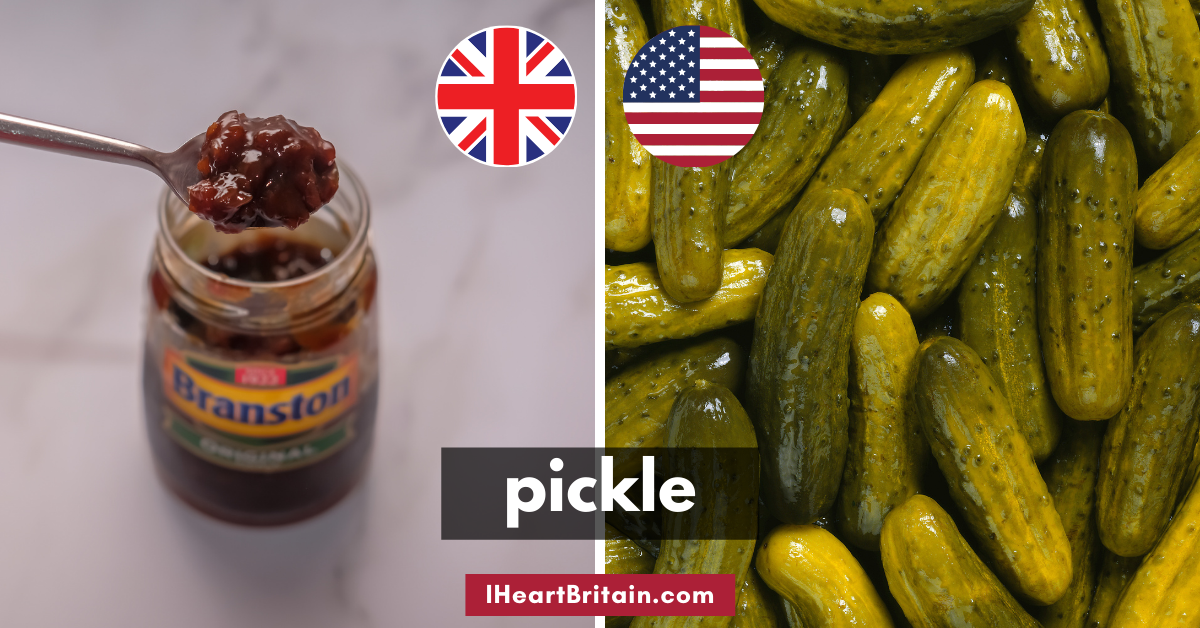
Pickle
In the US, “pickle” nearly always refers to a cucumber that has been pickled. In the UK, it's more typically a reference to Branston pickle, a chutney-type condiment made of root vegetables, vinegar, sugar, tomato, apple, date paste, and a few other ingredients. It's brown, and frequently used on cheese sandwiches (see also: What's a Cheese & Pickle Sandwich?).
Less commonly, pickle can be used to describe any vegetable that has been pickled.
So what do Brits call the pickled cucumbers Americans refer to as pickles? Those are gherkins.
Common
In the US, common generally refers to something one encounters on a regular basis. Slides are a common sight at playgrounds. Hamburgers are common at fast food restaurants. And so on.
In the UK, common CAN have that meaning – but it can also have a slightly negative meaning in some contexts.
If Jules Hudson is on Escape to the Country telling us thatched roofs are “common in this part of the country”, it doesn't mean anything unpleasant. On the other hand, if you're standing in line at Waitrose and the lady ahead of you is calling the new woman in her neighbourhood “common”, the claws are out.
It's a bit like how many people now use the word “basic” to say something is neither unique nor special.
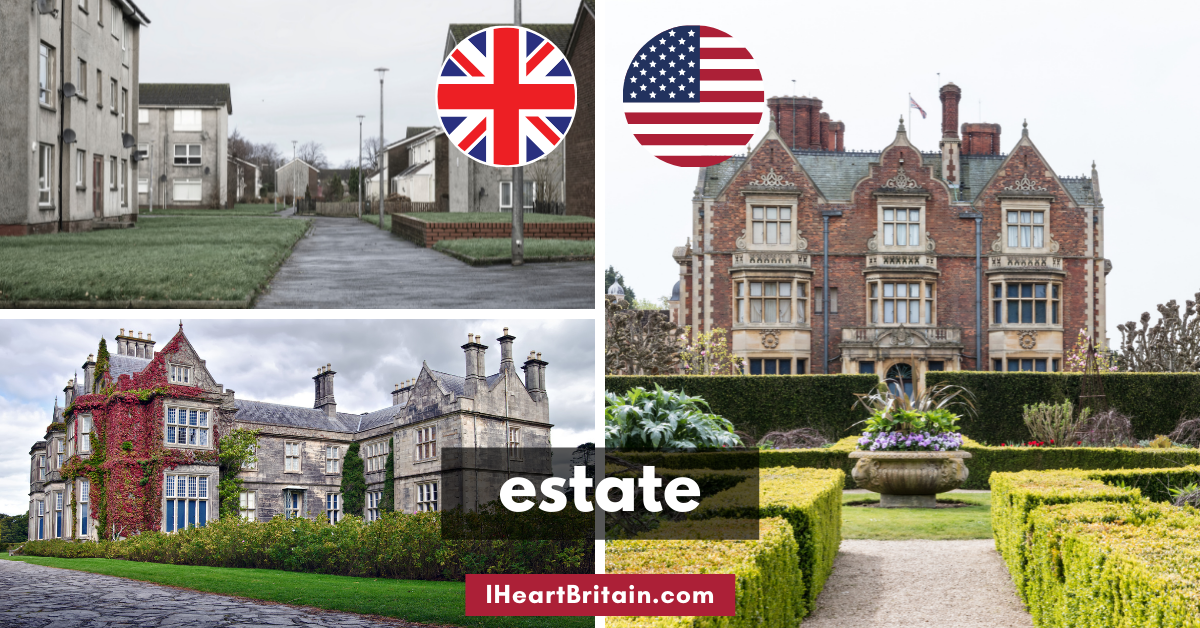
Estate
If you refer to someone's home as an estate, the typical American (who isn't an ex-pat or die-hard Anglophile) is going to picture some kind of grand country mansion. A British person, on the other hand, will be looking for a bit more context.
It's true that an estate CAN be something quite posh. Sandringham, the Norfolk-based country retreat of Queen Elizabeth II, is referred to as The Sandringham Estate (made up of Sandringham House & Gardens + Sandringham Royal Park).
At the other end of the spectrum, however, “estate” can be kind of a dirty word. In the 1940s, the word was used to describe any residential area where the houses and streets were planned and built together. Those housing estates were often full of poor people, and many of them were (and still are) effectively ghettos, especially as they became more run down over the years.
As a result, an American who hears that someone lives on Aylesbury Estate (a large public housing estate) will likely have a very different set of thoughts than a British person. You can read a little more about the loaded history of the word here.
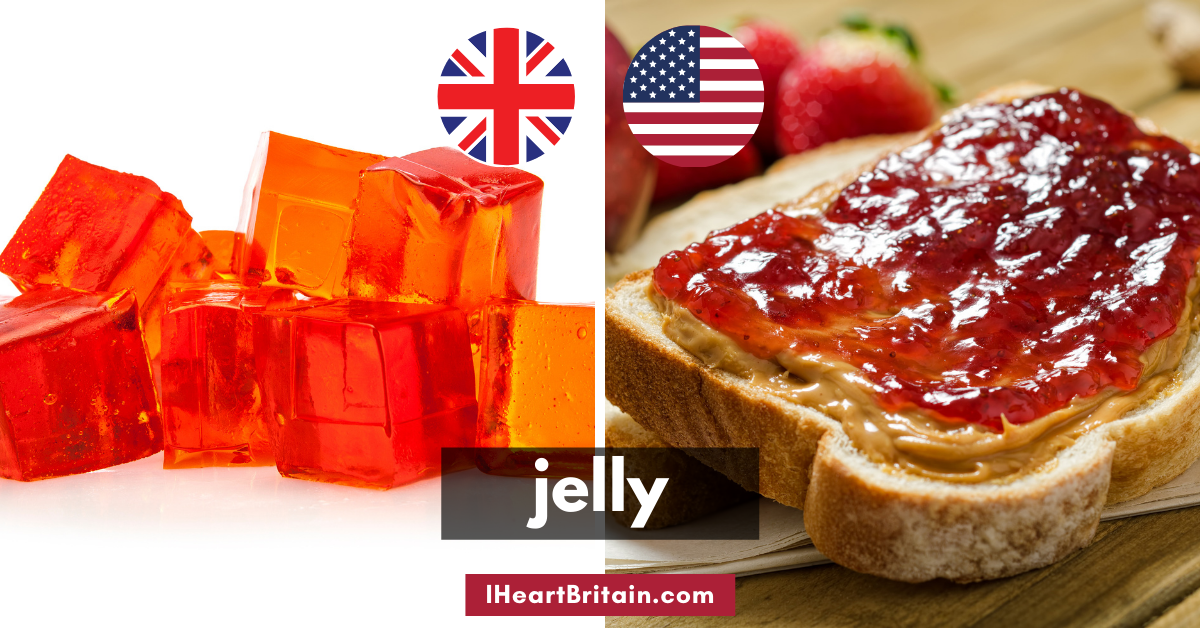
Jelly (vs. jam vs. jello)
In the UK, the word “jelly” calls to mind images of what most Americans refer to as Jell-o (or jello). Like this.
The fruity substance Americans call “jelly” is called “jam” in the UK. So what to Brits call American jam? Still just jam. Basically, the US has three terms for the three separate foods, while the UK bundles them under just two terms. Preserves (with the largest chunks) are the same in both countries.
Interestingly, some Brits don't actually realise there's a difference between American jam and American jelly, but there is. They're both spreadable fruit, but jelly is smoother and firmer because it's made with just the juice (+ pectin) and not the whole fruit. Homemade jelly might have a bit of pulp or even seeds depending on how it's strained, but as a general rule, jelly is largely clear and chunk-free. Jam has actual fruit chunks, and it's much easier to spread.
That's not to say there's NO “jelly” in the UK, though. Look around many supermarkets and you'll find things like mint jelly, chilli jelly, cranberry jelly, and bramble jelly. Of course, most of those are savoury, and some (like certain brands of mint jelly) will still have chunky bits.
Scheme
In the US, the word scheme nearly always refers to some kind of dishonest business or plan. Not so in the UK. In the UK, it's very often used in the same way Americans might say “program”.
Years ago, I was working with a British company on their affiliate programme. For those not familiar with affiliate marketing, it's basically a way that online merchants can allow companies and individuals to send people to their site (via special links) and earn a commission. While some affiliate marketers may use bad tactics, the there's nothing inherently bad or dishonest about it. Nearly all major companies have an affiliate marketing programme.
When I spoke with my English contact at the company, however, he always referred to the programme as “the affiliate scheme”. Because I didn't realise scheme was a fairly benign word in British English, I assumed he had little faith in the affiliate programme and perhaps thought there was something nefarious about it.
I eventually learned that in the UK, a scheme is just some kind of plan or system. Schools have grading schemes, workers have savings schemes, cities have housing schemes, and so on.
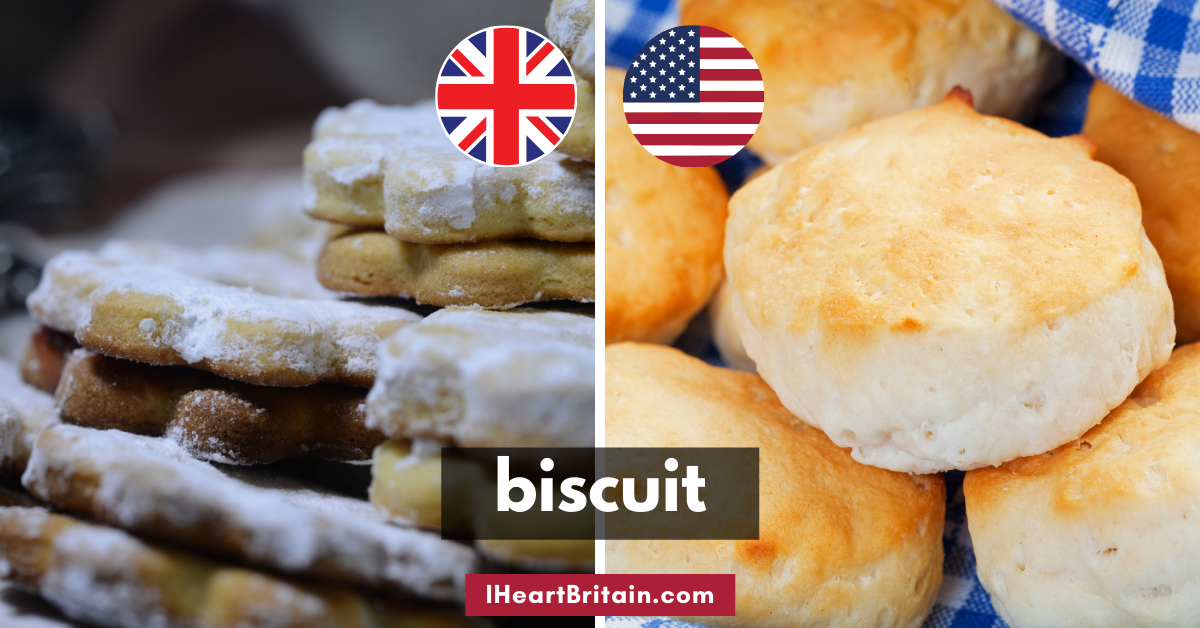
Biscuit
Though both are made of flour, British biscuits and American biscuits are very different. American biscuits are a bit like a savoury British-style scone.
British biscuits, on the other hand, encompass almost anything an American would call a cookie + many things Americans would call crackers. It's a big category. If someone tells you to head over to Tesco and pick up a box of “Jacobs Biscuits for Cheese”, for example, you'll be coming home with a box of what most Americans would call crackers.
To make matters more confusing, some Brits do call some biscuits cookies. Usually, this happens when they're larger and softer, but that's not a hard and fast rule. Waitrose, for example, has a line of own-brand “cookies” which are kind of like an upmarket Chips Ahoy. They're not particularly large or soft, but they still call them cookies (and regardless of what they call them, they're delicious – especially the Belgian Triple Chocolate ones).
Public school
In the US, “public school” refers to one of two things:
- Government-funded K-12 schools open to all age-appropriate individuals who live within the school's designated area
- Universities that are partially funded by the government and cheaper for people who live in that state (or other nearby states with reciprocal agreements)
As a general rule, saying someone went to public school does not imply wealth. If anything, it implies a lack of it (though there are some public schools that even wealthier people would be happy to attend).
In England and Wales, “public school” can refer to a handful of prestigious and very expensive schools that tend to be associated with the upper classes. They were originally called “public” because they charged money and allowed anyone to attend if they secured admission and paid the fee.
Schools like Eton and Harrow are considered “public schools” – and they educated people like David Cameron, Boris Johnson, Anthony Eden, Robert Walpole, Ian Fleming, Henry Fielding, Percy Bysshe Shelley, Jeremy Brett, Hugh Laurie, Tom Hiddleston, Winston Churchill, Lord Byron, James Blunt, Benedict Cumberbatch, Anthony Trollope, and most of the men in the British royal family.
If you hear a British man referred to as a “public school” bloke, think money and power – not under-funded schools with metal detectors in the hallway.
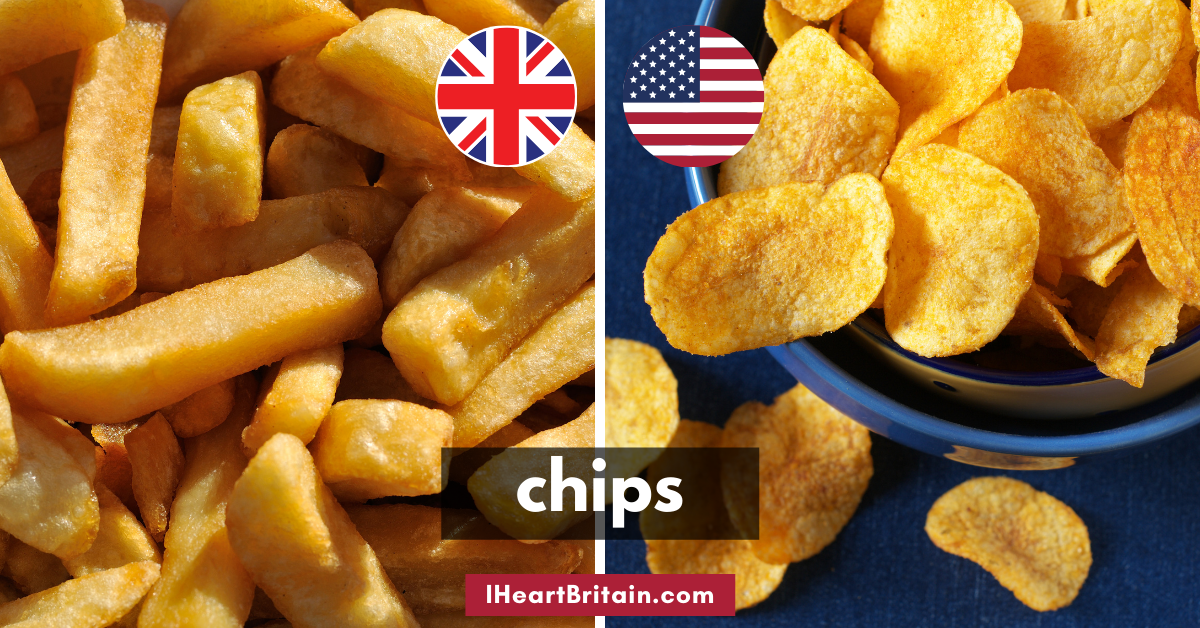
Chips
A lot of Americans think British people call French fries “chips”. That's mostly – but not entirely – true.
When a British person says “chips”, they're nearly always referring to what Americans would call “thick fries” or “steak fries”. The skinny ones? In most cases, British people will still call them fries – or possibly “frites”, if you're somewhere a bit pretentious. Not surprisingly, Waitrose sells bagged “frites”.
Though less common than chips, you can find “fries” all over the place. I've seen British restaurants with waffle fries, sweet potato fries, truffle fries, curly fries, and even katsu (curry) fries. Run a quick search on Deliveroo for any sizable British city and you'll find tons of places with “fries” on the menu.
Just remember: Thick fries are chips, thin fries are fries, and potato chips are crisps.
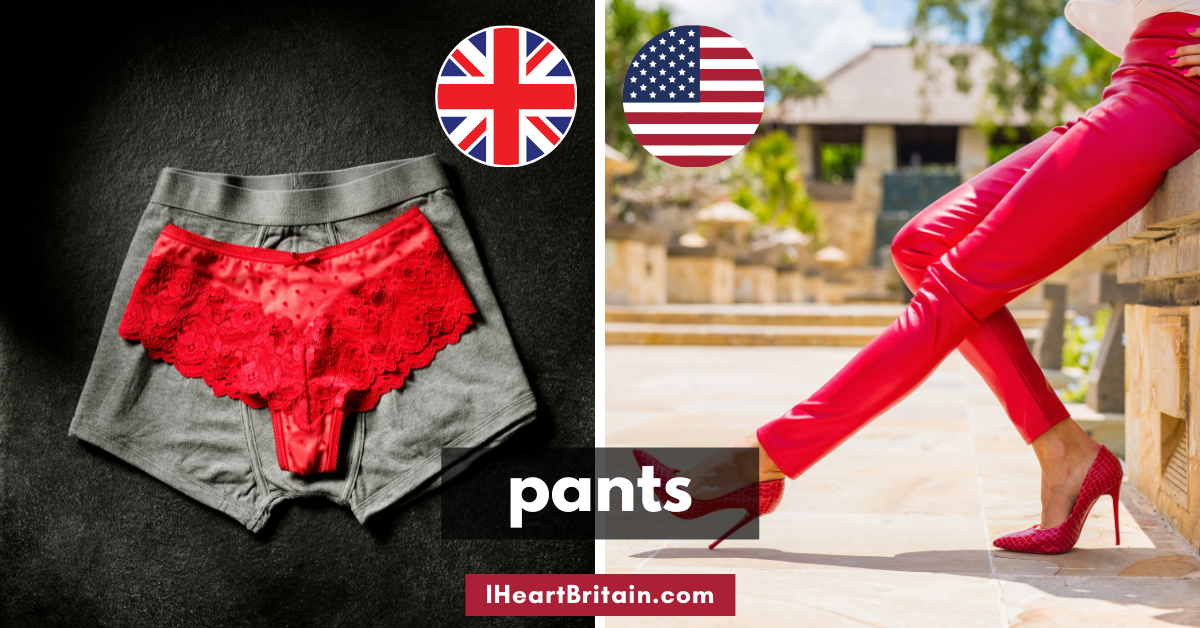
Pants
This is another one of those great, subtle differences that can make for hilarious situations. When an American talks about their pants, they're virtually always talking about long pants like trousers, leggings, or jeans. If they wanted to discuss their underwear, they'd say “underpants” instead.
When a British person says “pants”, there's a reasonably good chance they mean “underpants”.
It's not totally universal, but just give it a bit of thought before you ask someone what they think of your new “pants”.
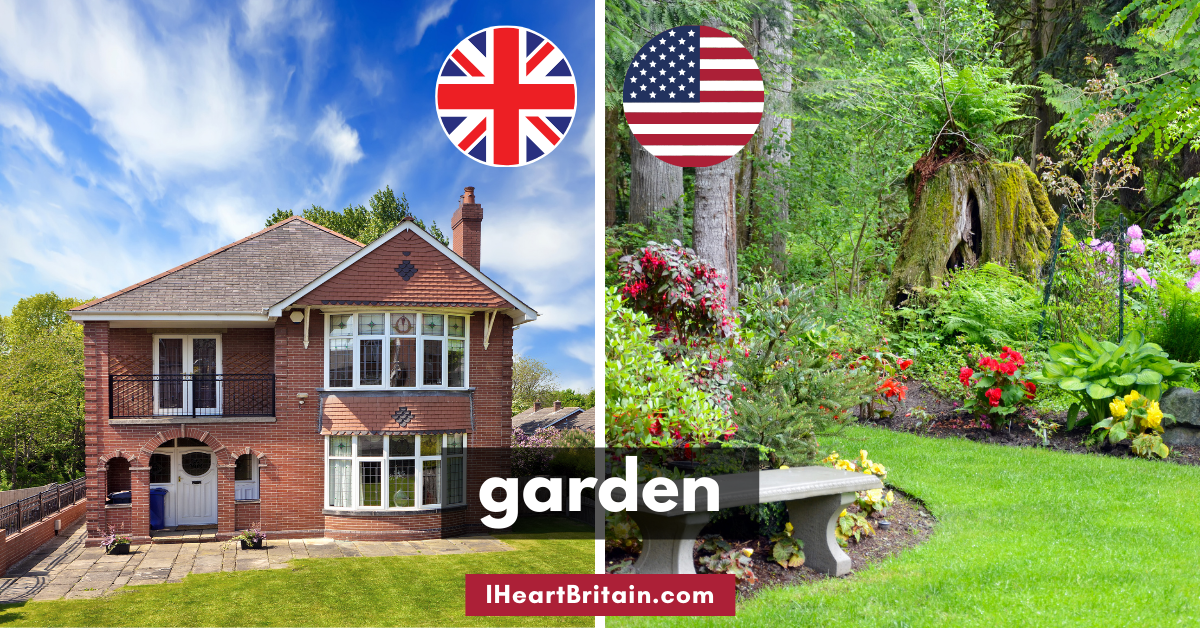
Garden
When most Americans hear the word “garden”, they're picturing a planned space full of plants. It could mean food plants or decorative plants, but it means some effort and thought went into it.
In the UK, a garden CAN be something like that – but it's also used more generally to refer to the outdoor space around one's home.
If you're watching a British house hunting show and you hear everyone going on about gardens, that doesn't necessarily mean everyone there is into gardening (although it IS a common British pastime). When someone says they want a spacious garden, it could be that they just want more space for the kids to run. It doesn't necessarily mean they're going to be entering their super-sized aubergines into the giant vegetable contest at the next village fete.
Can You Think of More Examples?
Have you ever been caught out by a slightly different meaning in British or American English? Don't hesitate to share your experiences and examples in the comments!
Save it to Pinterest!
